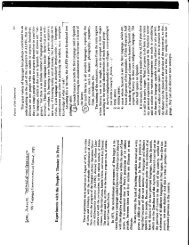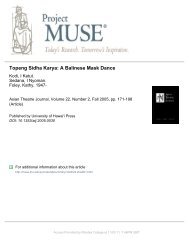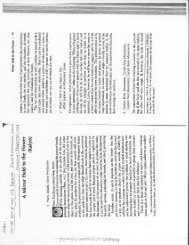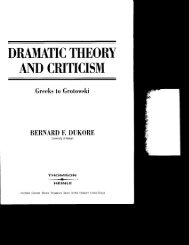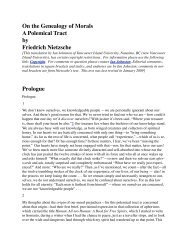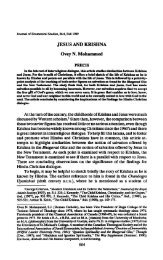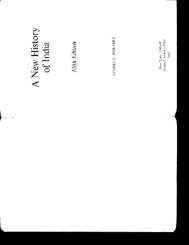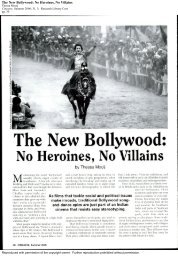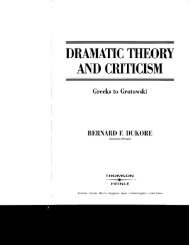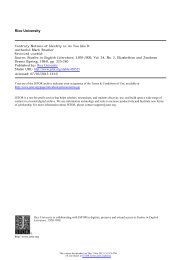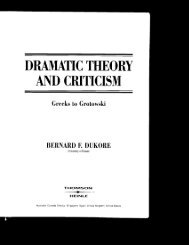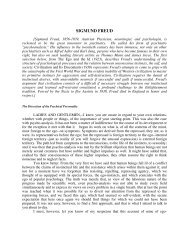Contemporary China - Yavanika
Contemporary China - Yavanika
Contemporary China - Yavanika
Create successful ePaper yourself
Turn your PDF publications into a flip-book with our unique Google optimized e-Paper software.
evoking human values and<br />
an Han, Ouyang Yuqian and<br />
to film as advisers, directors<br />
A complementary and con-<br />
,tas established benveen the<br />
:nt and the hhn studios. Xia<br />
'eturned dramatist and sceesentative<br />
of this trend. His<br />
ys Undcr a Shanghai RooJ<br />
d SaiJinhua were considered<br />
r the modern repertoire. The<br />
nation and suffering oftene-<br />
[eat city. The second con-<br />
Chinese courtesan, one of<br />
with Count Alfred von<br />
n conmander of the allied<br />
Beijing to relieve the Boxer<br />
mportant playwright of this<br />
graduate in Western literauniversify.<br />
His first play,<br />
irected by Hong Shen and<br />
|5 for the Fudan University<br />
hai, was an immediate sucd<br />
Greek drama and admired<br />
ton Chekhov, influences disith<br />
its dark connentary on<br />
tem and the social degradality<br />
of characterization and<br />
ed to an intuitive sense of<br />
play as a breakthrough for<br />
rama. Cao Yu's second play<br />
rd the corruptive power of<br />
rn him a literary prize.<br />
tamuyhosis lShuibian), Peking<br />
mily (Jia) followed, establishofsocial<br />
conscience.<br />
(en throughout the country<br />
g Dramatic Troupe, founded<br />
'Tang Huaiqiu. His goal was<br />
eatre on a financially viable<br />
rit, they achieved a homogeacting.<br />
Ihunderstorm broke<br />
br modeln theatre and this<br />
; Shen's eqr.rally successful<br />
The troupe's aim seemed<br />
ren in 1937 war intervened.<br />
e to Hong Kong for a brief<br />
ll to theJapanese at the end<br />
ln Decernber 1937 theatrc leaders, including<br />
Tian Han, tnet in Hankou to organize the National<br />
Dramatic Association to Resist the Eneny, an<br />
umbrella for all wartime theatrical activities. In<br />
February 1938 Tian Han became director of the<br />
government's Cultural Work Committee and head<br />
of the Propaganda Section, iind a zealous censorship<br />
was applied to all dramatic activify.<br />
Henceforward modern theatre was subordinated<br />
to national propaganda needs. A call fbr resistance<br />
united theatre people as never befbre. Itinerant by<br />
vocation, they responded with travelling troupes<br />
to take propagaDdist theatre to the lulal masses.<br />
Nationalists and Communists sharecl il conmon<br />
concepr ifwith divelgent ideological intent.<br />
The rapid advance of the invading fbrces drove<br />
the Nationalist government to set up their capital<br />
at Chongqing, Sichuan Province. Universities and<br />
major educational organizations followed then,<br />
together with those proninent in every field of the<br />
arts. The emotional climate was typified by thc<br />
manifesto ofXiong Foxi for his theatre students in<br />
west <strong>China</strong>: 'Cultivate modern drama with an<br />
artist's passion and a soldier's discipline to aid<br />
<strong>China</strong>'s spiritual regeneration.<br />
Students of the co-educational Nanjing National<br />
Academy of Dramatic Art, founded in 1935 and<br />
evacuated to Chongqing, made their professional<br />
debut staging stleet plays and'living newspapers'.<br />
A favoured technique entailed actors anonymously<br />
entering teahouses and drawing an audience by<br />
seemingly spontaneous dialogues on current<br />
affairs. Lack of pennanent stages and technical<br />
equipment in wartime territory did not deter the<br />
hundreds of itinerant troupes. Academics and literary<br />
nen frequently joined forces with professionals.<br />
Urban intellectuals and the rural population<br />
shared a new direct relationship as the result<br />
of dramatic activities.<br />
Tian Han, official spokesman fbr theatre in<br />
wartime, encouraged these trends as a healthy portent<br />
for the future. He adapted such traditional<br />
Beijing-opera favourites as The \4&ite Snake (Boishc<br />
zhuan) for modern production. Criticized at the<br />
time, his version became standard after the war.<br />
Ouyang Yuqian worked closely with Tian Han<br />
during those years, leading a troupe that toured<br />
patriotic plays. Hong Shen ran a theatrical troupe<br />
and taught hlm and drama in the universities. It<br />
was a time of shared skills and commitnents.<br />
Xia Yan's plays successfully car.rghthe public's<br />
mood. Typical was City oJSorrols (Chouchengji) satirizing<br />
life in Japanese-occupicd tclritory. Put down<br />
Your Wry (lang,xia nide btanzi) denounced Japanese<br />
aggression and was outstanding among the mass<br />
of propaganda pieces being produced. Cao Yu, in<br />
contrast, wrote nothing after his adaptation in<br />
1941 of Ba Jin's novel Fanrily. Xiong Foxi became<br />
disillusioned with governmcnt ccnsorship policy<br />
after serving as head of the Sichuan Provincial<br />
College of Dramatic Arts. He left for Guilin in the<br />
southwest where he engaged in writing and editorial<br />
work until 1945.<br />
Wartine Chongqing saw the germination of a<br />
national dance movement resulting fiom the wolk<br />
of Dai Ailian (1916 ), a Tlinidad-born Chinese<br />
danseuse. Aftcr studying ballet in lngland, patriotic<br />
motives led hcr to wartime <strong>China</strong>. While teaching<br />
in Chongqing she began studying local folk and<br />
minority nationality dances. With a team of pr.rpil<br />
assistanls she travelled to outlying areas researching<br />
and notating choreographic techniques, evcntually<br />
forming her owu conpany. Her pioneering<br />
work then prepared the way fbr organized dance<br />
educatior.r in <strong>China</strong> later.<br />
The tangential ingredients of narrative, solrg<br />
and descriptive gesture in folk dance embodied<br />
primal elemcnts of Chinesc theatrical comnunication.<br />
They appealed directly to the uncomplicated<br />
emotive responses of peasant audiences. Both<br />
Nationalists and Cor.nnunists sought to profit<br />
frorn this factor in their wartine sensitivity to fblk<br />
tradition. The Communists were the more uncompromising.<br />
The artistic criteria of folk genres were<br />
subordinated to theories ofproletarian drama created<br />
to eliminate the aesthetic 'elitisrn' of the old<br />
theatre.<br />
Following the Long March of 1934-5 the<br />
Cornmunists set up their base in the loessic caves<br />
at Yan'an in northern Shaanxi Province. Thele in<br />
May 1942 Mao Zedong gave his 'Talks at the Yan'an<br />
Forum on Literature and Art'. In them he<br />
expounded his Marxist manifesto destined to<br />
become the bible of all Chinese cultural endeavour.<br />
He spoke at the Lri Xun Art lnstitute which<br />
trained troupes to adapt old folk-perfornance<br />
methods to new content.<br />
One such ancient form nuch utilized by the<br />
Comnunists was the l,angge rice-planting song.<br />
Originally-yangge referred to simple rhythmic steps<br />
39



